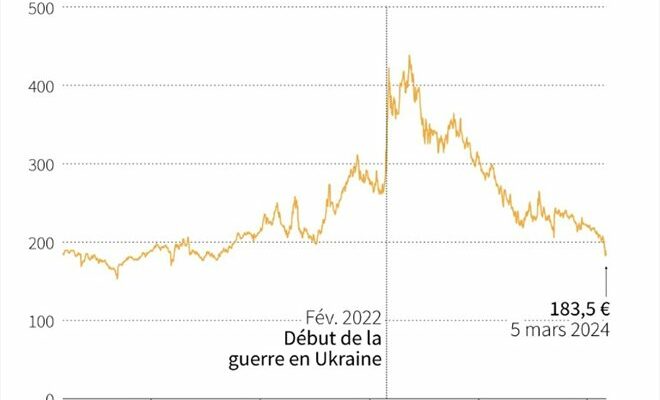Ukrainian Minister of Agriculture and Food Mykola Solsky, during an interview with AFP, March 25, 2024 in Brussels (AFP/Kenzo TRIBOUILLARD)
Kiev is ready to establish a licensing system governing its agricultural exports to provide assurances to Warsaw, Ukrainian Minister of Agriculture Mykola Solsky told AFP on Monday, “disappointed” with the restrictions imposed by the EU on products. from his country.
“We are ready to accept an export licensing system” for products destined for Poland, “but only for four types of cereals. We already have a similar system with Romania and Bulgaria,” he said. he underlined, on the eve of a meeting in Brussels with his counterparts from the Twenty-Seven.
Since February, Polish farmers have been blocking border crossings with Ukraine to protest against “unfair” competition from foodstuffs flowing from the country at war, exempt from customs duties by the EU since 2022. And Warsaw is calling for a cap on cereals Ukrainians, after having applied a unilateral embargo to them in 2023.
The two neighbors are looking for a way out of the crisis. “On Wednesday, a meeting will bring together Ukrainian and Polish agricultural organizations, I will participate with my Polish counterpart”, before “a joint meeting of the governments (of the two countries) on Thursday”, declared Mykola Solsky.

Demonstration of Polish farmers, March 20, 2024 in Warsaw (AFP/Archives/Wojtek Radwanski)
Quoted by the PAP agency, Polish Development Minister Krzysztof Hetman assured Monday that talks with Kiev were “very advanced, already at the stage of establishing sensitive products” for this licensing system, before a hoped-for conclusion “this week “.
Mr. Solsky is more cautious: “I cannot predict what will happen in Warsaw this week. I would like to be optimistic, but I have to be realistic.”
More generally, “the attention paid to this issue is much greater than the real problem” while “70% of cereals are exported to Asia, Africa and other regions”, he lamented. .
– “Certainly disappointed” –
Member states and MEPs have agreed to renew for one year, from June, the customs exemption granted to Ukraine, but by capping imports of poultry, eggs, sugar, corn and oats from Ukraine into the EU to 2022-2023 volumes, levels above which tariffs will be reimposed.

Ukrainian Minister of Agriculture and Food Mykola Solsky, during an interview with AFP, March 25, 2024 in Brussels (AFP/Kenzo TRIBOUILLARD)
Some states now want to see wheat also capped.
“We are certainly disappointed. We would have liked to at least discuss the figures. Thus, Ukraine has filled a sugar deficit in the EU: the price of sugar today is twice as high as before the war, and Ukrainian sugar has prevented it, two years in a row, from increasing even further,” Mykola Solsky annoys. “It’s not a problem for farmers.”
Furthermore, “Ukraine supplies the EU with about 1% of its total egg consumption, 2% of its poultry consumption: which Ukrainian refugees in the EU could easily consume. I am not convinced that It’s disrupting the market.”
He recognizes a fall in wheat prices, but which also penalizes Ukrainian farmers: according to him it is explained by “high Brazilian, Argentinian and American harvests”, and European restrictions will hardly influence prices “set in Chicago and on world markets.
European agricultural organizations, however, denounce “unfair” competition from Ukrainian products that do not respect European standards (giant farms, pesticides, etc.) and, above all, are very cheap.

Fall in wheat prices (AFP/Archives/Valentin RAKOVSKY, Valentina BRESCHI)
What Mr. Solsky refutes: “Ukrainian farmers pay more for their fertilizers (mostly imported), we currently have a serious shortage of labor that we don’t know where to find, all logistical costs are higher than they would otherwise be.” anywhere in Europe, not to mention insurance”.
French President Emmanuel Macron also assured on Friday that “large European groups” were diverting the customs exemption “to produce in Ukraine and re-import with lower production rules on our soil”.
What surprises the minister: “We have many companies (traders) like Louis Dreyfus present for 20 years in Ukraine (…) but in general the activity has not increased, it is not so easy” to operate in a country at war, he objects.
Finally, regarding Brussels’ proposal to tax Russian agricultural products, Mykola Solsky judges that it is “a step in the right direction” but calls “to go further, with a total embargo”.
© 2024 AFP
Did you like this article ? Share it with your friends using the buttons below.




